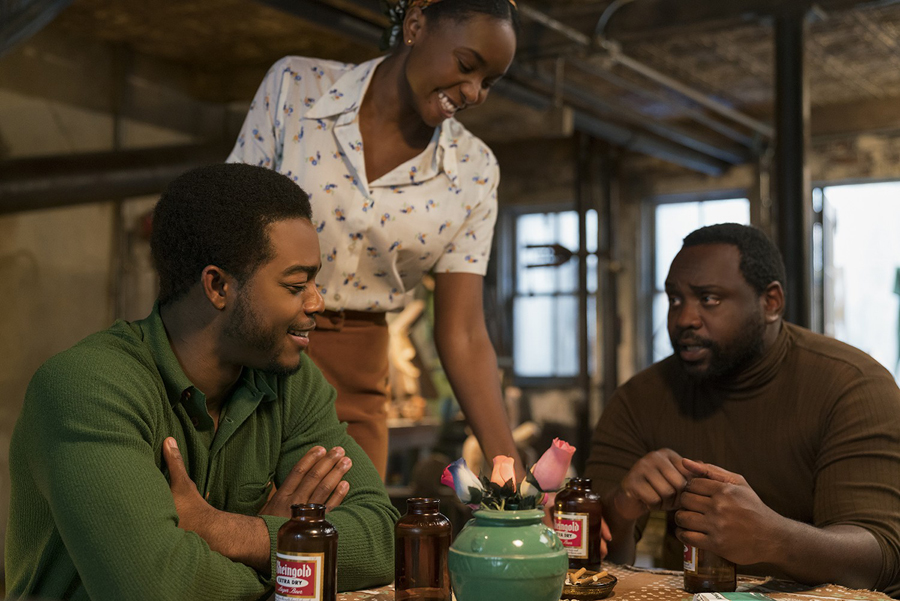The Enduring Relevance of ‘If Beale Street Could Talk’
The film adaptation of James Baldwin’s 1974 novel imbricates joyful moments within a fraught political and racialized landscape
The film adaptation of James Baldwin’s 1974 novel imbricates joyful moments within a fraught political and racialized landscape

In Barry Jenkins’s 2018 Oscar-nominated screen adaptation of James Baldwin’s 1974 novel, If Beale Street Could Talk, the protagonist and narrator, nicknamed Tish – portrayed, in a stunning screen debut, by KiKi Layne – embodies a certain stubborn, tremulous hope as she stands behind the counter of a brightly lit, New York department-store, surrounded by a selection of perfume bottles. Employed as a sales assistant, 19-year-old Tish, who is having to work through the final two trimesters of her pregnancy, narrates her experiences of interacting with a high-end clientele and reveals how her role also requires her to function as a kind of public attraction. In another sequence, feeling the strain of her advanced pregnancy, Tish almost breaks the glass counter, the camera zooming in on her gritted teeth as she describes the exhaustion she feels at having to smile on demand for the white men who manipulate the retail experience into something sinister, as if they’re entitled to her perfumed flesh. It is one of the film’s strongest scenes: a montage of interactions mediated by race and class.

Tish’s voice-over also alludes to the political structures grounding the film in the realities of US police brutality during the 1970s, as Fonny (Stephan James) – her fiancé and the father of her unborn child – is falsely accused of rape and imprisoned. Baldwin’s book draws partly on the writer’s experience of being briefly incarcerated for a minor offence in Paris and on that of his friend and former secretary, Tony Maynard, who was wrongly indicted, imprisoned and beaten in a Hamburg prison. While Baldwin’s original prose is barbed with multiple references to rape culture, the novel’s edges of brutality and violence are softened somewhat under Jenkins’s lush directorial gaze. Here, the cruelty and trauma of systemic incarceration are alluded to in small, controlled lapses, providing a sober contradiction to the euphoric opening of two young lovers walking in the park. The scene is interlaced with stark archival imagery of white policemen brutalizing Black Americans on the street, contextualizing Harlem as a historical site of Black life in a sombre recognition of racial violence. This explicit documentary realism imbricates joyful moments within a fraught political and racialized landscape.
Throughout the film, difficult scenes end abruptly. Tish’s narration allows for such repressions and we accept the story’s incompleteness because it is told from her perspective. Still, potentially rewarding moments are snatched away from us as we experience a series of interruptions that, at times, seem oddly jarring and insufficiently contextual. Yet, there are some touching exceptions: in a scene of wordless expression, Tish and Fonny shout elatedly in the streets after securing a loft near Canal Street. Uninterrupted, their shared tenderness is luxuriated in, while Nicholas Britell’s vivid, Oscar-nominated, original orchestral score provides precisely the required timbres of cinematic melancholy and romanticism. It is a joy to watch.

Nonetheless, threats of catastrophic danger simmer constantly. One such precarious incident occurs in a quiet, blistering scene in which Tish is harassed in a market and Fonny is almost arrested as he defends her. Both are rendered speechless and awkward by the encounter. A more ominous silence returns in a striking scene when the camera, in a single fluid shot, pans from tomatoes smashed against a red-brick wall to the young Black couple who, in their quiet shared desperation, are trying to recover from a tense encounter with a random street attacker and their new neighbourhood patroller, the sinister Officer Bell (Ed Skrein), who plays a key role in the destruction of their family. Fonny and Tish are isolated in a way that, under Jenkins’s agile direction, veers sharply from idyllic to catastrophic. As the film progresses, Fonny’s simmering rage is gradually neutralized: he becomes accustomed to life in prison and (off-screen) negotiates a plea deal. Whereas in the novel, Baldwin leaves Fonny in a kind of limbo, in the film, Jenkins offers us a more complicated resolution. Fonny, Tish and their son, Alonzo Jr., are still very much in a prison – one in which the iron bars may not be visible but are ever-present.
Main image: Barry Jenkins, If Beale Street Could Talk, 2019, film still. Courtesy: Annapurna Pictures and Tatum Mangus






















